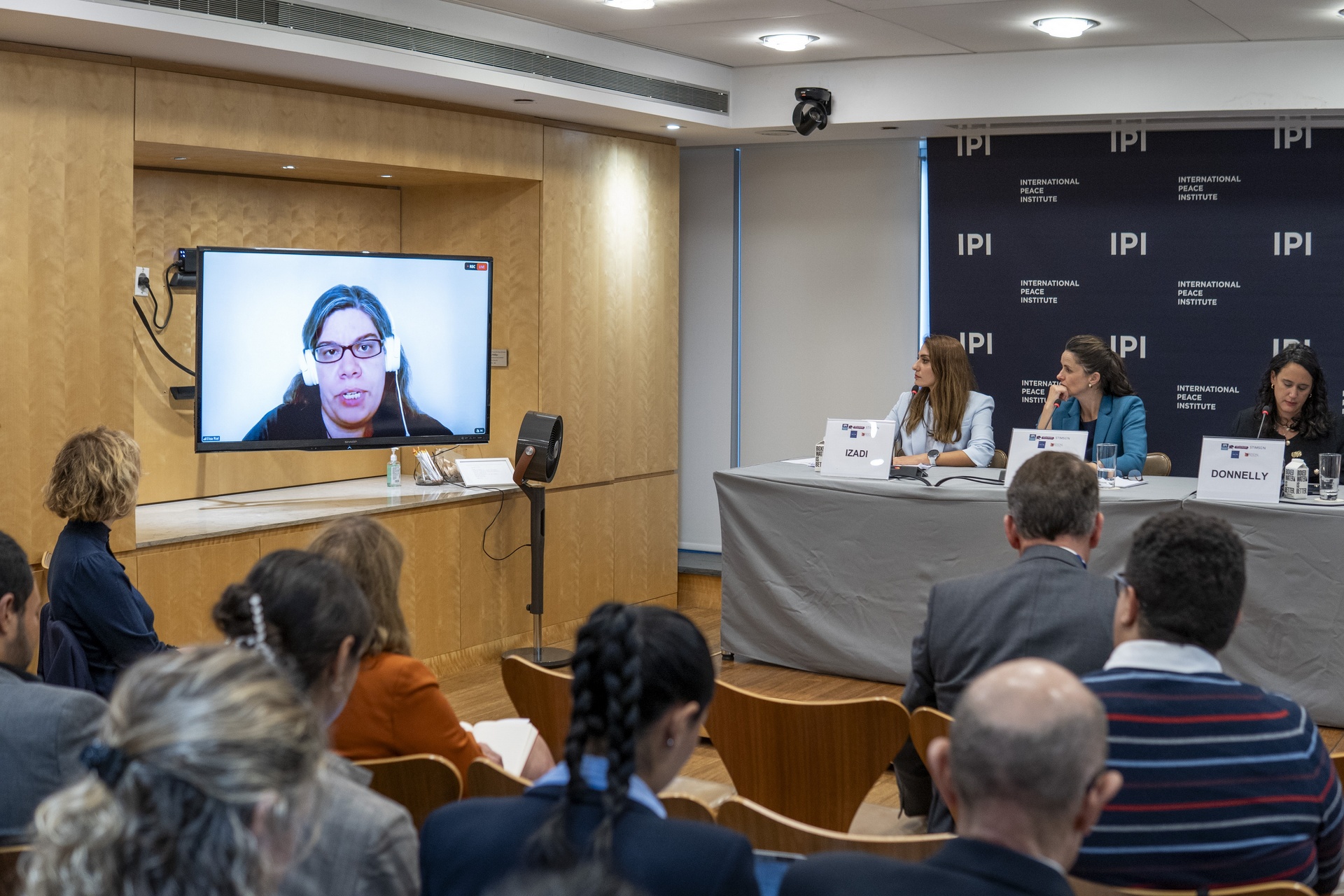RESDAL
participates in the policy forum “Reflecting on 25 Years of the WPS Agenda:
Lessons Learned from Gender Research and UN Peace Operations”

On
October 9, the International Peace
Institute (IPI), in partnership with the Elsie Initiative for Women in Peace Operations (led by Global Affairs Canada), the Stimson Center, the Latin American Security and Defence Network
(RESDAL), and the Gender and
Security Sector Lab (GSS), co-hosted a hybrid policy forum titled “Reflecting on 25 Years of the WPS Agenda:
Lessons Learned from Gender Research and UN Peace Operations.”
The
conversation provided an opportunity to share research findings, reflect on
lessons and challenges for women in peacekeeping, consider the role of research
in advancing the WPS agenda, and strengthen communities of practice to ensure
the sustainable implementation of recommendations on gender equality in
peacekeeping. With discussions around UN reforms underway, severe funding
crises, shrinking space for women’s civil society, and rising anti-gender
backlash, partnerships between researchers, practitioners, and member states
committed to defending and advancing the WPS agenda are more important than
ever.
A Space for Reflection and Dialogue
The meeting
provided an opportunity to share research findings, analyze lessons learned and
challenges faced by women in peace missions, and discuss the role of research
in advancing the Women, Peace and Security (WPS) Agenda.
It also helped strengthen communities of practice
dedicated to ensuring the sustainable implementation of gender equality
recommendations in peacekeeping.
In the
context of ongoing UN reforms, funding crises, the shrinking space for civil
society, and a growing anti-rights discourse, participants underscored that
partnerships among researchers, practitioners, and Member States are now more
essential than ever to sustain and deepen the progress achieved.
Speakers and
contributions
Opening
remarks were delivered by Zeid Ra’ad Al
Hussein, President and CEO of the International Peace Institute, and Lieutenant General Mohan Subramanian,
Force Commander of the United Nations Mission in South Sudan (UNMISS).
Panelists
included Jacqueline O’Neill, former
Women, Peace, and Security Ambassador for Canada and Director at Global Affairs
Canada; Lisa Sharland, Senior Fellow
and Director of Protecting Civilians & Human Security at the Stimson
Center; Elisa Rial, Programme
Coordinator at the Latin American Security and Defence Network (RESDAL); Roya Izadi, Assistant Professor at the
University of Rhode Island; Joana
Osei-Tutu, Deputy Director of the Women Youth Peace and Security Institute
at the Kofi Annan International Peacekeeping Training Centre (KAIPTC); and Colonel Roger Nilsson, Counsellor and
Military Advisor at the Permanent Mission of Sweden to the United Nations.
Christian Saunders, Under-Secretary-General and
Special Coordinator on Improving the UN Response to Sexual Exploitation and
Abuse, delivered the closing remarks. The discussion was moderated by Phoebe Donnelly, Senior Fellow and Head
of Women, Peace, and Security at IPI.
Key insights
Speakers
reflected on the progress and remaining challenges in integrating gender
perspectives in peacekeeping operations. They emphasized the importance of
institutional leadership, accountability, and data-driven research in
translating WPS principles into practice.
Discussions also
underscored the continued need to bridge research, policy, and operational
implementation—ensuring that lessons from gender-focused studies are applied to
training, doctrine, and planning at both national and mission levels.
Participants
highlighted that while women’s participation in peacekeeping has increased,
representation in decision-making and leadership positions remains limited.
Ensuring the sustainability of progress requires ongoing collaboration among UN
agencies, member states, civil society, and academia.
RESDAL’s participation
Representing
RESDAL, Elisa Rial joined the panel
virtually and shared insights drawn from the organization’s regional research
under the Elsie Initiative. Rial
emphasized that national defence
institutions in the Global South have demonstrated a growing commitment to the
WPS agenda, with increasing inclusion of women in their ranks and
leadership. She noted that this progress is most effective when backed by
top-level endorsement and integrated into institutional protocols and training.
“Contrary
to what is sometimes assumed, there is no real backlash against the WPS agenda
within defence institutions in the Global South,” Rial observed. “On the contrary,
there is a strong willingness to engage—to discuss how to keep advancing the
agenda and how best to implement it within their own structures. Regional
solidarity and peer learning are essential to sustain these efforts.”
Rial
also underscored the value of Elsie-funded
research in identifying gaps in awareness and implementation of
gender-related frameworks within defence and police institutions. She
highlighted RESDAL’s forthcoming work to develop a regional database and guide to make these tools more accessible and
usable across institutions.
Throughout
this participation, RESDAL reaffirmed
its commitment to fostering regional collaboration and evidence-based
policymaking, promoting solidarity among Global South institutions, and
contributing to global dialogue on how to make the WPS agenda a sustainable and
institutionalized reality.
Watch the full conference (YouTube)



